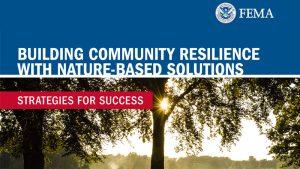 FEMA’s Nature-Based Solutions guides outline how nature-based solutions can be used in sustainable planning and community resiliency, often at a lower cost than traditional infrastructure. The FEMA guide serves for local communities to learn about nature-based solutions and weigh their value for the community.
FEMA’s Nature-Based Solutions guides outline how nature-based solutions can be used in sustainable planning and community resiliency, often at a lower cost than traditional infrastructure. The FEMA guide serves for local communities to learn about nature-based solutions and weigh their value for the community.
FEMA’s site organizes Nature-Based Solutions into three categories: Watershed or landscape-scale practices, Neighborhood or site-scale practices, and Coastal practices. A page on the website discusses planning for nature-based solutions, and the departments and governmental and non-governmental organizations involved.
Browsers can also find extensive information on FEMA’s hazard mitigation assistance programs which provide grants to eligible state, local, tribal, and territorial partners to reduce risk from many hazards.
Under the website’s page on funding nature-based solutions, people can learn more about mitigation planning and the requirements for applying to certain types of grants.
FEMA continuously updates its collection of reports, blogs, webinars, external sources and other resources to help support the pursuit of nature-based solutions. Other topics people can explore on this website include National Risk and Capability Assessments, Building Science, Dam Safety, Earthquake Risk, Hurricane Planning and Response, Windstorm Impact Reduction, and Safe Rooms.
FEMA offers additional multimedia resources like blogs, reports, and webinars on nature-based solutions and mitigation.
FEMA can connect browsers to program agencies that focus on issues most relevant to the browser.
Click here for more information.




